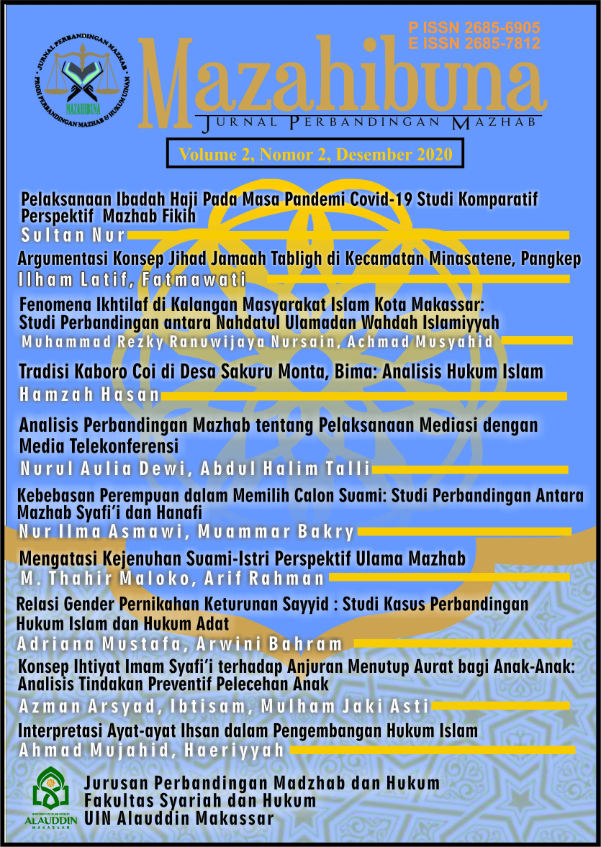Relasi Gender dalam Pernikahan Keturunan Sayyid di Desa Cikoang Kabupaten Takalar; Studi Kasus Perbandingan Hukum Islam Dan Hukum Adat
Abstract
Islamic law holds that the concept of kafaah comes from various aspects, namely religion, descent, property, and face. Among these four things, Sharia prioritizes religion as the main yardstick in determining the concept of kaffah. On the other hand, customary law views that the marriage of sayye descendants in a society still maintains their familiarity, system and belief in the descendants of the Prophet Muhammad. rules that have become absolute and nothing can be seen. However, the marriage system becomes a problem because it can exclude women, and their rights as women. The purpose of this study was to examine and trace the ins and outs of the Sayye marriage system so that gender relations were born among the Sayye community. The research method used is field research and is qualitative and comparative. Sources of data used in this study come from primary and secondary data. The result of this research is that the form of Sayyid's marriage gender relation has the right to determine in his lifeReferences
Abdul Syatar. “TRANSFORMATION OF FIQH IN THE FORMS OF HAJJ AND ZAKAT LEGISLATION.” Mazahibuna; Jurnal Perbandingan Mazhab 1, no. 2 Desember (2019): 120–133. http://journal.uin-alauddin.ac.id/index.php/mjpm/article/view/11646.
Achmad Musyahid. “DISKURSUS MASLAHAT MURSALAH ERA MILINEAL (Tinjauan Filosofis Terhadap Konsep Maslahat Imam Malik).” Mazahibuna; Jurnal Perbandingan Mazhab 1, no. 2 (2019): 134–145.
Abdullah, Irwan. Seks, Gender dan Reproduksi Kekuasaan. Yogyakarta: Tarawang Press, 2001.
Ali, Suki. Global Feminist Politics: Identities in Changing World. New York: Routledge, 2000.
Ch, Mafudah. Psikologi Keluarga Islam Berwawasan Gender. Malang: UIN Malang Press, 2008.
--------. Paradigma Gender. Malang: Bayumedia Publishing, 2003.
Fakih, Mansour. Analisis Gender & Taransformasi Sosial. Cet. V: Yogyakarta; Pustaka Pelajar, 2013.
--------. Posisi Kaum Perempuan dalam Islam: Tinjauan Analisis Gender. Tarjih, Edisi 1 Desember 1996.
Hilman Hadikusuma. Hukum perkawinan adat. Bandung:PT.Citra Aditya Bakti,1990.
J, Kessler Suzanne dan Wendy Mckenna. Gender: An Ethnometodological Approach. New York: John Willey & Sons, 1997.
Kementrian Agama RI Al-Qur’an Al-Karim dan Terjemahannya. Surabaya: Halim, 2013.
Megawangi, Ratna. Membiarkan Berbeda: Sudut Baru Tentang Relasi Gender. Cet. 1; Bandung: Mizan, 1999.
Mosse, Julia Cleves. Gender dan Pembangunan. Yogyakarta: Pustaka Pelajar, 2007.
Mulia, Siti Musdah. Kekerasan terhadap Perempuan Mencari Akar Kekerasan dalam Teologi. SAWWA Jurnal Studi Gender/ Semarang: PSG IAIN Walisongo, 2008.
--------. Keadilan dan Kesetaraan Gender Perspektif Islam. Cet II: Jakarta; Lembaga Kajian Agama dan Gender, 2003.
Musyahid, Achmad. “Kesetaraan Gender Perspektif Filsafat Hukum Islam”. Jurnal Sipakalebbi, Vol. I No. 1. 2013.
Naro, Wahyuddin, Abdul Syatar, Muhammad Majdy Amiruddin, Islamul Haq, Achmad Abubakar, and Chaerul Risal. “Shariah Assessment Toward the Prosecution of Cybercrime in Indonesia.” International Journal of Criminology and Sociology 9 (2020): 572–586. https://doi.org/10.6000/1929-4409.2020.09.5
Nugroho, Riant. Gender dan Strategi Pengarus Utamanya Di Indonesia. Yogyakarta: Pustaka Pelajar, 2011.
Nur, Djaman, Fikih Munakahat. Semarang: Dina Utama Semarang. 1993.
Rahman, Abdul. Perkawinan Dalam Syariat Islam. Jakarta: PT. Rhineka Cipta, 1996.
Riant Nugroho. Gender dan Strategi Pengarus Utamanya Di Indonesia. Yogyakarta: Pustaka Pelajar, 2011.
Sabiq, Sayyid. Fiqh Sunnah 6. Bandung: al-Ma’arif, 1980.
Sihab, Umar. Hukum Islam Dan Tranformasi Pemikiran. Semarang: Dinautama, 1996.
Soepomo. Hukum Adat. Jakarta: PT Pradnya Paramita 1993.
Sumbulah, Umi ddk. Spektrum Gender Kilasan Inklusi Gender di Perguruan Tinggi. Malang: UIN Malang Press, 2008.
Thalib, Sayuti. Hukum Kekeluargaan Indonesia. Jakarta: Ui Press, 1974.
Umar, Nasaruddin. “Perspektif Gender dalam Islam” Jurnal Paramadina, Vol. I, No. 1, Juli-Desember 1998.
--------. Argumen Kesetaraan Gender: Perspektif Al-Qur’an. Cet. I; Jakarta: Paramadina,1999.
Yuliani, Febri. “Pengaruh Partisipasi Masyarakat terhadap Upaya Penghapusan Kekerasan dalam Rumah Tangga di Kota Pekanbaru” Spirit Publik. Vol. 4, No. 2. 2008.

This work is licensed under a Creative Commons Attribution 4.0 International License.
Authors who publish with Mazahibuna: Jurnal Perbandingan Mazhab agree to the following terms:
- Authors retain copyright and grant the Mazahibuna: Jurnal Perbandingan Mazhab right of first publication with the work simultaneously licensed under Creative Commons Attribution License (CC BY 4.0) that allows others to share the work with an acknowledgment of the work's authorship and initial publication in this journal.
- Authors can enter into separate, additional contractual arrangements for the non-exclusive distribution of the published version of the work (e.g., post it to an institutional repository or edit it in a book), with an acknowledgment of its initial publication in this journal.
- Authors are permitted and encouraged to post their work online (e.g., in institutional repositories or on their website) before and during the submission process, as it can lead to productive exchanges, as well as earlier and greater citation of published work.

